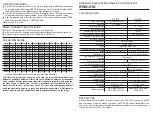
3
REMOVAL
1. Block or hold the vehicle by means other than the air
brakes.
2. Drain all air brake system reservoirs.
3. Identify, mark, and disconnect all air lines from the R-8
™
relay valve.
4. Remove the R-8 valve from its mount on the vehicle.
DISASSEMBLY OF VALVE
1. Note and mark position of the valve cover to the body.
2. Remove the four 5/16" - 18 hex screws and separate
the cover from the body. Some valves have a piston
return spring; if so, remove.
3. Remove the sealing ring (5) from the body.
4. Remove the piston, cap nut, and diaphragm (7) from
the cover.
5. Remove the o-ring (1) from the cap nut and the o-ring (2)
from the piston.
6. Remove the four 10-24 screws which secure the
exhaust cover to the body.
7. Remove the screw, washer, and diaphragm (6) from
the exhaust cover.
8. Remove the complete inlet and exhaust valve assembly (4)
from the valve body.
ASSEMBLY
Prior to assembly of new parts in the valve, clean all parts
in a cleaning solvent equivalent to mineral spirits making
sure all surfaces, bores, and passages are clean and dry.
Grease all o-rings, bores, pistons and internal parts with
the lubricant (8) supplied in the kit.
1. Install the o-ring (3) on the inlet and exhaust valve
assembly (4).
2. Install the diaphragm (6) and diaphragm washer and
secure with a screw. Torque screw to 15-25 in-lbs.
3. Install the inlet and exhaust valve assembly (4) in the
valve body. Position exhaust cover assembly so that
all holes are properly aligned and secure with four
10-24 screws. Torque screws to 20-30 in-lbs.
4. Install the sealing ring (5) in the valve body.
5. Install the piston return spring if the valve requires a
spring.
(See "Disassembly", Step 2.)
6. Install the o-ring (2) on the piston and then install the
piston and o-ring in the cover.
7. Install the o-ring (1) on the cap nut.
8. Install the diaphragm (7) in the cover and install the
cap nut. Make certain the diaphragm is free to move
and is not pinched by the cap nut. Torque cap nut to
180-400 in-lbs.
9. If valve is so equipped, install the exhaust cover and
secure it with a 10-24 screw. Torque screw to 15-24
in-lbs.
10. Install the cover assembly on the valve body as marked
and secure with four 5/16" hex head screws. Torque
to 120-150 in-lbs.
INSTALLATION
1. Mount the Bendix
®
R-8
™
valve on the vehicle.
2. Connect the air lines to the R-8 valve using the
identification made during Step 3 of "Removal"
instructions.
3. Perform "Operating and Leakage Checks" before
placing the vehicle in service.
OPERATING AND LEAKAGE TEST
1. Block the wheels and fully charge the air system. Adjust
the brakes.
2. Apply and release the parking brakes several times
and check for prompt response of the brakes at all
appropriate wheels.
3. With the park control valve in the "brakes applied"
position, coat the exhaust port with a soap solution to
check for inlet valve and o-ring leakage; a 1" bubble in
5 seconds is permissible.
4. Place the park control valve in the "brakes released"
position and again check at the exhaust port for
leakage of the exhaust valve; a 1" bubble in 3 seconds
is permissible. Apply a soap solution around the valve
where the cover joins the body to check for seal ring
leakage; no leakage permitted.
5. With the park control still in the "brakes released"
position, apply a soap solution to the quick release
exhaust port to check the diaphragm exhaust seat; a
1" bubble in 3 seconds is permitted.
Note:
If the anti-compound feature is in use, the line
attached to the R-8 quick release valve exhaust must
be disconnected to perform this test.






















